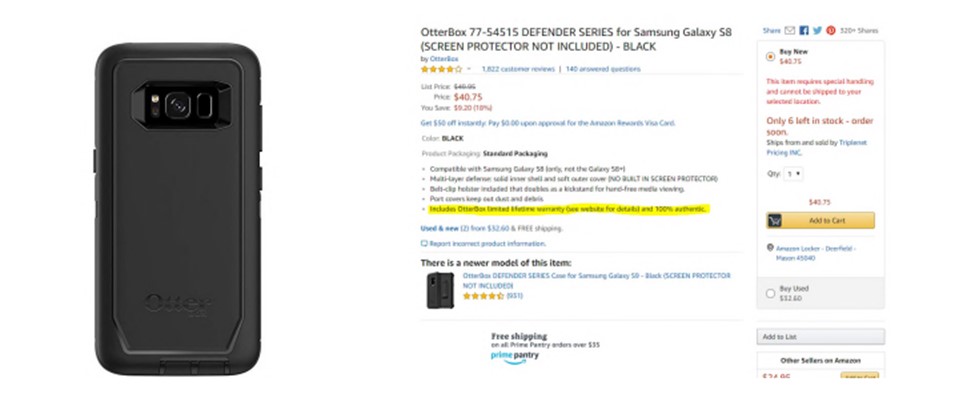Many brands consider gray market goods sold on Amazon a perennial problem. In Otter Products, LLC, et al. v. Triplenet Pricing, Inc., the United States District Court for the District of Colorado granted partial summary judgment in favor of the trademark owner, holding that the first sale doctrine did not immunize Triplenet from Otter’s trademark claims.
Otter Products, LLC and Treefrog Developments, Inc. (“Otter”) sued Triplenet Pricing Inc., Triplenet Pricing, LLC, and Eric Sypes, (“Triplenet”) for trademark infringement, unfair competition, false advertising, and deceptive trade practices in violation of the Colorado Consumer Protection Act. Otter sells mobile phone and tablet cases under its OtterBox and LifeProof Brands. It provides a warranty for products purchased directly from it or authorized sellers. Without authorization and so without Otter’s warranty protection, Triplenet sold products bearing Otter’s trademarks on the internet including on Amazon. In its Amazon listings for Otter branded products, however, Triplenet represented that purchases included an “OtterBox limited lifetime warranty.” Otter argued that although the products were manufactured by Otter, the missing warranty turned the products into gray market goods. For its part, Triplenet filed counterclaims seeking declaratory judgment that it did not infringe Otter’s trademarks and alleging tortious interference with contract, intentional interference with prospective economic advantage, and deceptive and unfair trade practices.

Otter moved for partial summary judgment on its trademark infringement and unfair competition claims, as well as its false advertising and deceptive trade practices claims. It also sought summary judgment on all of Triplenet’s counterclaims.
In opposition, Triplenet argued that the first sale doctrine shielded it from liability arising from Otter’s trademark and unfair competition claims. As the court acknowledged, “the right of a producer to control distribution of its trademarked product does not extend beyond the first sale of the product.” Australian Gold, Inc. v. Hatfield, 436 F.3d 1228, 1240–41 (10th Cir. 2006). Nevertheless, courts have recognized two exceptions to the first sale doctrine: (1) the “material difference” exception, and (2) the “quality control” exception. If either applies, an alleged infringer may not be protected by the first sale doctrine.
Here, the court held that both exceptions applied, stripping Triplenet of its first sale doctrine defense. First, the court evaluated whether Triplenet’s products were “not ‘genuine’” because they “are materially different than those sold by the trademark owner.” Beltronics USA, Inc. v. Midwest Inventory Distribution, LLC, 562 F.3d 1067, 1072 (10th Cir. 2009). Since the products sold by Triplenet do not include Otter’s warranty, the court found a material difference. Second, the court evaluated whether Triplenet’s product distribution did not meet Otter’s quality control standards. Foremost, Otter established that it had legitimate quality control measures insofar as it allows its products to be sold to consumers only by it or authorized resellers. Additionally, Otter’s authorized resellers must follow detailed instructions on shipping, product inspection, removal and reporting of damaged goods, and product display. Otter established that its quality controls were not pretextual by producing evidence that, for example, it regularly audits its online authorized sellers’ websites and product listings. Moreover, the court found that Triplenet’s nonconforming sales diminished the value of Otter’s trademarks because such sales interfered with Otter’s ability to ensure its products adhered to its quality standards. Consequently, citing the Second Circuit, the court held that Triplenet’s “non-conforming product is deemed for Lanham Act purposes not to be the genuine product of the holder, and its distribution constitutes trademark infringement.” Warner-Lambert Co. v. Northside Dev. Corp., 86 F.3d 3, 6 (2d Cir. 1996).
Otter also succeeded on its false advertising claims by producing uncontradicted evidence showing that its warranty does not apply to products sold by Triplenet. Similarly, the court ruled in Otter’s favor on its Colorado Consumer Protection Act (“CCPA”) claim. “The [Colorado Consumer Protection Act (“CCPA”)] was enacted to regulate commercial activities and practices which, “because of their nature, may prove injurious, offensive, or dangerous to the public.” Peterson v. USAA Life Ins. Co., 353 F. Supp. 3d 1099, 1112 (D. Colo. 2018), aff’d, 814 F. App’x 408 (10th Cir. 2020). Because Triplenet’s false statements regarding the Otter warranty were directed to the market generally, particularly through its Amazon storefront, the statements were sufficient to impact the public and violated the CCPA.
In light of the court’s ruling that the products sold by Triplenet were not genuine because of the material difference and quality control exceptions to the first sale doctrine, this decision may provide a framework for future actions by brands seeking to maintain a curated network of authorized retailers.
The case is Otter Products, LLC, et al. v. Triplenet Pricing, Inc., et al., 1:19-cv-00510 (D. Col. Nov. 10, 2021).



 />i
/>i
